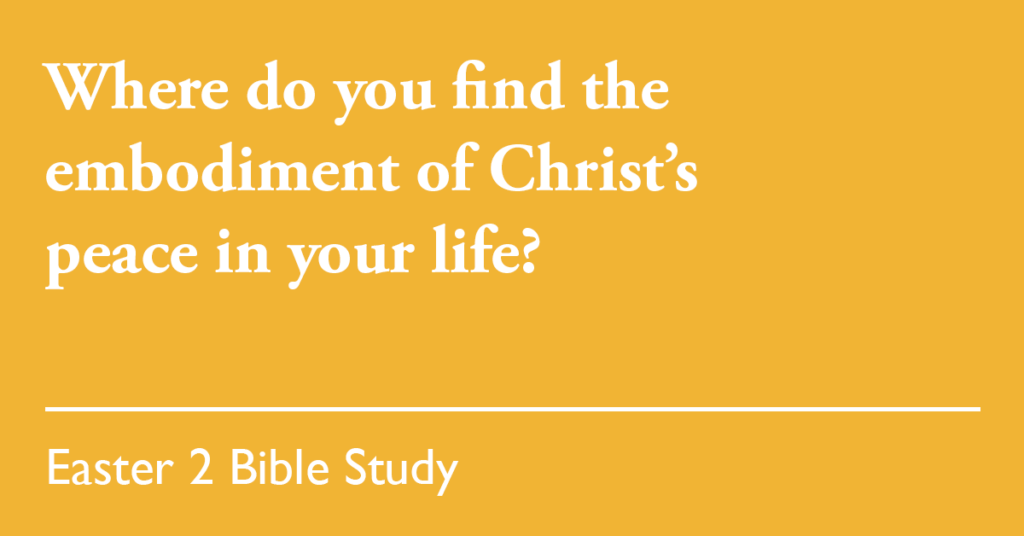This page is available in: Español
Bible Study: Easter 2 (C) – 2022
April 24, 2022
RCL: Acts 5:27-32; Psalm 118:14-29 or Psalm 150; Revelation 1:4-8; John 20:19-31

Acts 5:27-32
This snippet of the Acts of the Apostles comes in the middle of an exciting story. Peter and the apostles have been preaching in Jerusalem, and they have been imprisoned. An angel orchestrates a jailbreak for them. Instead of fleeing, they return to the temple to continue preaching on orders from their heavenly rescuers. Arrested again, this is Peter’s testimony to the religious authorities.
In today’s American culture, it is both profoundly mainstream and countercultural to be Christian. This seeming contradiction is in the preponderance of Christmas sales, but also in the reluctance of many Christians to “mix religion and politics” or guide their behaviors by Jesus’ words in the Sermon on the Mount. While we may not be under the same threat as the apostles, the danger of losing face or seeming “too religious” feels real.
- Where do I feel called to fully live into Jesus’ teachings? What is the cost?
- What prayers do I need to live more fully into Christ’s callings for me?
Psalm 150
We are reminded daily of the loss from COVID, even as transmission rates drop. We totter on the edge of war. And yet, here we are in the Easter season, singing songs of praise. Does it feel out of place? How do we live into the promise of the Resurrection when it feels that outside of church, death and suffering have the last word? And yet, our psalm today urges us to praise God despite it all.
Perhaps this psalm may feel out of sync with how we are feeling. Despite the liturgical calendar, the constant barrage of death we see on the news may not leave us fully convinced in resurrection.
However, poet Rainer Maria Rilke wrote that we should “walk [our] walk of lament on a path of praise.” The psalmist here shows us how: we are reminded to dance, to exult, to come to the temple. Our laments, our sadness, like the cornerstone that has been rejected, are what God uses to rebuild and resurrect that which was lost.
- What in your life needs resurrection? What do you need to lament so you can praise God today?
Revelation 1:4-8
This passage is a powerful reminder that as Christians who have entered into life with the resurrected Christ, we are time travelers!
This seemingly mundane salutation opens the Book of Revelation. Revelation is an apocalyptic text. While pop culture has used these kinds of texts in horror and zombie movies, they are actually revelations. They reveal something to us about the true nature of things as God has created them, beyond what we can see in our everyday, linear existence.
The address of this letter to seven churches in Asia is a reminder that this piece of Scripture was written in a specific time and place for a particular audience. But its message is universal: Christ is the beginning and the end. When we participate in the heavenly banquet of the Eucharist, we stand with all who throughout time have worshiped God in glory and peace. In this uncertain moment of linear time, this passage is a profound reminder that God’s love and promises transcend a temporary moment. We are freed from sin by Jesus’ death and resurrection.
It doesn’t make our time any easier, but this passage reminds us that we face the challenges of the world with Jesus at our side.
- What has been revealed to you in the last two years? How can we read apocalyptic texts, such as Revelation, with hope rather than fear?
John 20:19-31
This piece of scripture offers a tantalizing one-liner at the end: “Now Jesus did many other signs in the presence of his disciples, which are not written in this book. But these are written so that you may come to believe…”
The last few years have left many of us shaken: war threatens again in Europe, COVID rates rise and fall, economic uncertainties continue to nip at our heels. We want reassurance: we want to touch the promised miracle, like Thomas was able to touch the resurrected body of Christ. We believe, but we struggle to find that peace that Jesus promised his followers when he appeared to him after the resurrection.
However, this passage shows us that our bodies matter: Jesus appeared to his friends enfleshed. Perhaps his body was not the same after his crucifixion and resurrection, but the fact he came embodied is not just coincidence: it’s a mark of our Incarnational theology. With his body, Jesus breathes on his disciples and touches them. He brings with his body his peace. As his modern disciples, it is our job to embody Christ’s peace and bring it to the world.
- Where do you find the embodiment of Christ’s peace in your life? Where do you embody it for others? Where can you seek it out in places you haven’t before?
This page is available in: Español
Don’t forget to subscribe to the Sermons That Work podcast to hear this sermon and more on your favorite podcasting app! Recordings are released the Thursday before each liturgical date.
Receive Free Weekly Sermons That Work Resources!
This page is available in: Español


